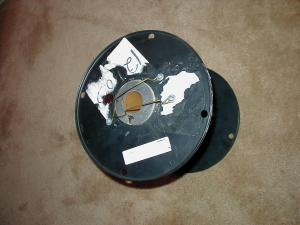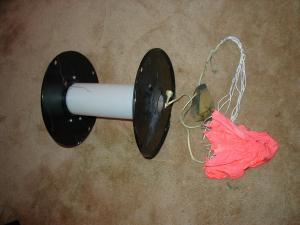Scratch Scott's Spool Rocket Original Design / Scratch Built
Scratch - Scott's Spool Rocket {Scratch}
Contributed by Scott Pearson
I have seen numerous references of spool rockets on RMR the first time I saw a mpeg of one fly I was really surprised that it could fly. So the other day when I finished off a spool of cable at work I knew exactly where that spool was going.
 I started looking around for articles on
how to build them and verify stability. I did not find much; I might not have
looked hard enough. I did find the Lobbin’ Bobbin built by Dick Stafford
on EMRR and used it as a pattern for mine as the spools were the same size and
dimensions.
I started looking around for articles on
how to build them and verify stability. I did not find much; I might not have
looked hard enough. I did find the Lobbin’ Bobbin built by Dick Stafford
on EMRR and used it as a pattern for mine as the spools were the same size and
dimensions.
My materials were one spool, one centering ring, one piece of 38mm motor mount tube, three feet of 1/8-inch Kevlar® string, four screws and washers, one coat hanger and one 18 inch parachute. These parts were then turned into my Level 1 certification rocket in two evenings. Really easy to build.
I had to use the Dremel to open up the center holes, just a bit, to accommodate the 38mm motor tube. I epoxied the centering ring to the bottom of the tube and the bottom of the spool at the same time. I also epoxied the tube around the top end of the spool.
The next night I sanded a bit to clean it up and drilled a hole in the centering ring to match a hole on the other side of the tube to use for the launch rod. I tied the Kevlar® string onto the main rim of the spool and added a Nomex® pad to protect the parachute. When you load the engine there is no room for wadding so a Nomex® pad is a must. I then took a coat hanger and cut and bent it into shape for my motor retention.
Simple and cheap this; rocket cost less then 10 dollars.
I took it out to Fire on the Farm and procured a 2-grain Pro38 H153 for its maiden flight. The parachute just fit in the 4-5 inches left in the tube, I added a piece of masking tape just to make sure that they parachute did not slip out before ejection. We called a heads-up flight as the stability was still questionable at that point and the winds were high (10mph-15mph) and we were not sure if that would effect it.
 The Spool ripped off the pad with a little
waggle in the tail, made it to about 200 feet when the thrust stopped and the
spool went out of control, spinning and spinning. The crowd and RSO thought
that it was a tumble recovery, then the chute popped and it settled down for a
nice landing.
The Spool ripped off the pad with a little
waggle in the tail, made it to about 200 feet when the thrust stopped and the
spool went out of control, spinning and spinning. The crowd and RSO thought
that it was a tumble recovery, then the chute popped and it settled down for a
nice landing.
I got my level 1 and lots of questions and compliments. People really liked the low slow flight and wanted another flight and so did I. This time a 3-grain Pro38 I205 was the motor of choice. This motor only left about 3 inches for the parachute so I stuffed in what I could and taped over the rest.
The Spool ROARED off the pad, maybe to 300-350 feet fewer waggles this time, when the thrust ended the spool again went into a spin until the chute popped. The chute did not deploy completely as it was caught in the tape that I had holding it in. The spool landed a little bit hard and cracked the plastic rim, not too much that it cannot be fixed. Next time I will take the bottom of a pop bottle and put the parachute in this plastic dome and tape the dome to the rocket, I hope that this should keep the tape away from the chute.
Pro’s – Cheap, Fun, durable, easy to build
Con’s – Cheap, does not fly high
 |
 |